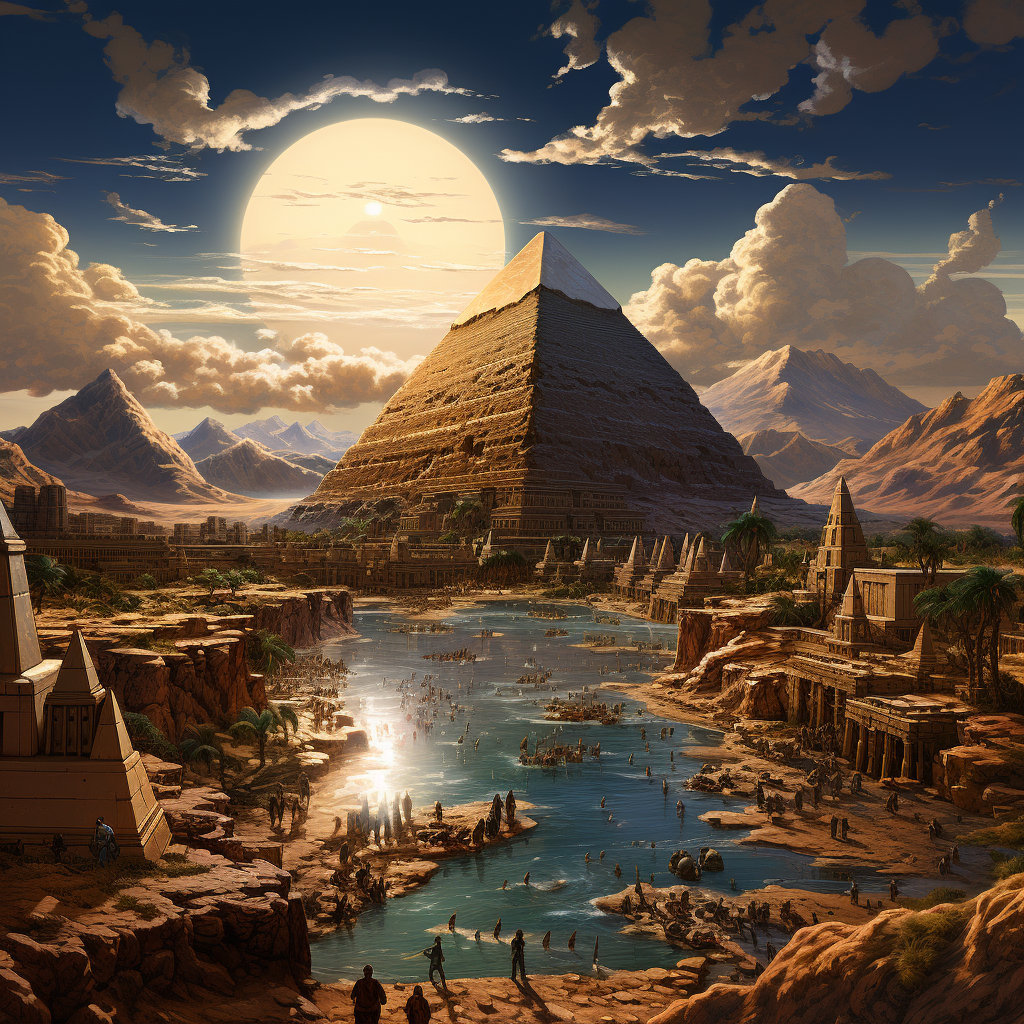A worldview is a comprehensive perspective on the nature of reality. It encompasses one’s beliefs about the world, the cosmos, and human beings. A worldview provides a framework for making sense of everything – from the most mundane details of everyday life to the most complex and abstract concepts.
Over the centuries, different worldviews have emerged and competed for dominance. In this article, we will explore the history and evolution of some of the most prominent worldviews in the West.
Table Of Contents.
- Pre-Modern Worldviews
- The Enlightenment and Modern Worldviews
- Post-Modern Worldviews
- Contemporary Worldviews
Pre-Modern Worldviews

Pre-Modern Worldviews:
Ancient Greek Philosophers:
The worldview of ancient Greek philosophers laid the foundation for philosophical thought in Western civilization. Thinkers like Socrates, Plato, and Aristotle pondered questions about the nature of reality, ethics, and the purpose of life. Their ideas centered around the belief in a rational and ordered universe, with an emphasis on reason and logical inquiry. This worldview influenced various fields, including ethics, politics, and the natural sciences.
Medieval Christianity:
During the Middle Ages, Christian theology heavily influenced the prevailing worldview. The worldview of medieval Christianity emphasized the existence of God and the primacy of faith. The Church played a central role in shaping societal values and worldviews. The belief in divine revelation and the hierarchical structure of society were integral components of this worldview.
💡 key Takeaway: Pre-modern worldviews, such as those held by ancient Greek philosophers and medieval Christian thinkers, laid the foundation for philosophical thought and heavily influenced societal values during their respective eras.”
Ancient Greek Philosophers
Ancient Greek Philosophers:
The ancient Greek philosophers laid the foundation for many of the worldviews that would emerge in later centuries. These influential thinkers were known for their deep contemplation and exploration of fundamental questions about human existence, the nature of reality, and the purpose of life. Some of the most well-known Greek philosophers include Socrates, Plato, and Aristotle.
1. Socrates: Socrates was known for his Socratic method of questioning, which aimed to stimulate critical thinking and self-reflection. He believed that true wisdom comes from acknowledging one’s own ignorance and constantly examining one’s beliefs and values.
Quote: “The only true wisdom is in knowing you know nothing.” – Socrates
2. Plato: Plato was a student of Socrates and went on to become one of the most significant philosophers in history. He believed in the existence of an ideal realm of forms and argued that the physical world is merely a reflection of these perfect, eternal forms.
– Plato’s Allegory of the Cave: In this allegory, Plato illustrates the difference between the world of appearances and the world of true knowledge. It emphasizes the importance of seeking enlightenment and transcending the limited understanding provided by our senses.
3. Aristotle: Aristotle was a student of Plato and focused on empirical observation and logical reasoning. He explored a wide range of disciplines, including ethics, politics, biology, and physics. Aristotle believed in finding the middle ground between extremes and emphasized the pursuit of virtue for the flourishing of individuals and society.
– Aristotle’s Four Causes: Aristotle proposed that everything in the world exists for a purpose and can be explained by four causes: the material cause, the formal cause, the efficient cause, and the final cause.
💡 key Takeaway: The ancient Greek philosophers, such as Socrates, Plato, and Aristotle, made significant contributions to the development of worldviews through their exploration of philosophical questions and concepts. Their ideas continue to influence and shape philosophical and ethical perspectives in the contemporary world.
Medieval Christianity
Medieval Christianity: A Pillar of Pre-Modern Worldviews
During the medieval period, Christianity served as a predominant and influential worldview in Europe. The teachings and beliefs of the Catholic Church shaped the lives of individuals and the structure of society.
1. Church Authority and Dogma:
The authority of the Church was indisputable, and its teachings were considered absolute truths. The Pope served as the spiritual leader, while bishops and priests acted as intermediaries between God and the people. Dogmas, such as the belief in the Holy Trinity and the concept of original sin, formed the foundation of Christian theology.
2. Sacraments and Rituals:
Medieval Christianity emphasized the importance of sacraments and rituals. These sacred practices were believed to bring individuals closer to God and ensure their salvation. Mass, baptism, confession, and the Eucharist were crucial aspects of religious life, offering both spiritual guidance and communal bonding.
3. Role of Monasticism:
Monasticism played a significant role in medieval Christianity. Monks and nuns dedicated their lives to prayer, contemplation, and service to God. Monasteries acted as centers of learning, preserving knowledge and disseminating it through scriptoria, where manuscripts were copied by hand.
4. Influence on Art and Architecture:
Medieval Christianity greatly influenced the art and architecture of the period. Churches, cathedrals, and monastic buildings were constructed with grandeur, reflecting the divine nature of God. Iconography and stained glass windows depicted biblical stories, serving as visual aids for religious instruction.
5. Censorship and Religious Control:
During this time, the Church exercised strict control over intellectual and ideological matters. The Inquisition was established to suppress heresy and maintain orthodoxy. Books deemed heretical or contrary to Church teachings were banned and destroyed, limiting freedom of thought and expression.
💡 key Takeaway: Medieval Christianity was a dominant force in pre-modern worldviews, shaping religious, social, and cultural aspects of medieval society while exerting control over intellectual inquiry and expression.
The Enlightenment and Modern Worldviews
The Enlightenment and Modern Worldviews
During the Enlightenment, a significant shift occurred in the way people understood and approached the world. This period, which took place in the 18th century, was characterized by an emphasis on reason, science, and the pursuit of knowledge. Two key events that played a crucial role in shaping modern worldviews were the Scientific Revolution and the French Revolution.
1. The Scientific Revolution:
The Scientific Revolution marked a turning point in human history. It challenged traditional beliefs and introduced new ways of thinking about the natural world. Prominent figures like Galileo Galilei, Isaac Newton, and Francis Bacon pioneered empirical methods of inquiry and formulated scientific laws that laid the foundation for modern physics, astronomy, and biology. Their discoveries and theories encouraged a shift away from superstition and toward evidence-based reasoning.
2. The French Revolution:
The French Revolution, which occurred from 1789 to 1799, brought about significant political, social, and cultural changes. It challenged the ideas of traditional authority and hierarchy and sparked a call for equality, liberty, and fraternity. The Enlightenment ideals of reason, individual rights, and the pursuit of happiness became intertwined with the revolutionary spirit. This period of upheaval gave rise to new political ideologies and worldviews that continue to influence society to this day.
💡 key Takeaway: The Enlightenment and Modern Worldviews were shaped by the Scientific Revolution and the French Revolution, which emphasized reason, evidence-based inquiry, and the pursuit of individual rights and freedoms.
The Scientific Revolution
The Scientific Revolution marks a pivotal moment in the history and evolution of worldviews. During this period, which spanned from the 16th to the 17th century, a radical shift in thinking and understanding of the natural world took place.
Breakthroughs in Scientific Inquiry
– The Scientific Revolution was characterized by significant advancements in various fields of study, including physics, astronomy, and biology. Scholars such as Galileo Galilei, Johannes Kepler, and Isaac Newton made groundbreaking discoveries that challenged traditional beliefs and laid the foundation for modern scientific thought.
– Quote: “In questions of science, the authority of a thousand is not worth the humble reasoning of a single individual.” – Galileo Galilei
The Emergence of Empiricism and Experimental Methodology
– One of the key features of the Scientific Revolution was the embrace of empiricism and the establishment of experimental methodology. Scientists began to rely on direct observation, measurement, and experimentation to gather evidence and formulate theories, moving away from reliance on ancient authorities and philosophical speculation.
– Quote: “To explain all nature is too difficult a task for any one man or even for any one age. ‘Tis much better to do a little with certainty, and leave the rest for others that come after you, than to explain all things by conjecture without making sure of any thing.” – Isaac Newton
Paradigm Shifts and the Impact on Worldview
– The discoveries made during the Scientific Revolution challenged prevailing religious, philosophical, and cultural beliefs. The heliocentric model of the universe put forth by Copernicus, for example, contradicted the geocentric views upheld by the Catholic Church. These paradigm shifts forced society to reevaluate its understanding of the cosmos, human existence, and the relationship between science and religion.
– Quote: “The sun, with all those planets revolving around it and dependent on it, can still ripen a bunch of grapes as if it had nothing else in the universe to do.” – Galileo Galilei
💡 key Takeaway: The Scientific Revolution marked a significant turning point in the history of worldviews, with its emphasis on empirical observation, experimental methodology, and revolutionary discoveries challenging traditional beliefs.
The French Revolution
The French Revolution:
The French Revolution, which took place from 1789 to 1799, was a period of profound socio-political and cultural transformation in France. This event had a significant impact on shaping modern worldviews. The revolution was driven by a range of societal grievances, including economic inequality, political corruption, and the oppressive rule of the monarchy. During this period, the French people sought to establish a more egalitarian and democratic society.
Key developments during the French Revolution included the overthrow of the monarchy, the establishment of a republic, and the rise of radical political factions such as the Jacobins. The revolution also witnessed the Reign of Terror, a violent phase marked by mass executions and political purges. The execution of King Louis XVI, along with other prominent figures, further signaled a break from traditional institutions and the pursuit of a new societal order.
The French Revolution had a profound impact on shaping modern political thought and worldviews. It challenged the notion of divine right monarchy and laid the foundation for the spread of democratic ideals across Europe and beyond. Philosophical concepts such as liberty, equality, and fraternity gained prominence during this time and continue to influence political discourse to this day.
Quotes:
– “It is the revolution that has led me to philosophy, and not the other way around.” – Jean-Paul Sartre
– “Liberty, equality, fraternity” – The motto of the French Revolution
Key Takeaway:
The French Revolution was a transformative period in history that had a lasting impact on modern worldviews. It challenged the established social and political order and paved the way for the spread of democratic ideals and the questioning of traditional institutions.
Post-Modern Worldviews

Post-Modern Worldviews
Post-Modern Worldviews emerged as a response to the perceived limitations and deficiencies of modernist ideologies. Unlike the grand narratives of the Enlightenment and Modern era, post-modernism emphasizes the skepticism towards overarching truths and instead looks at the subjective nature of knowledge and reality. One significant post-modernist movement is Existentialism, which gained prominence in the mid-20th century. Existentialism explores themes of individual existence, freedom, and the search for meaning in an increasingly fragmented and absurd world. Influential figures such as Jean-Paul Sartre and Albert Camus emphasized the importance of personal responsibility and choice in navigating an existence devoid of inherent purpose. As Sartre famously stated, “Existence precedes essence.”
Another influential post-modernist movement is Post-Structuralism. Building upon structuralism, which focused on the underlying structures in language and culture, post-structuralism asserts that meaning is contingent and dependent on interpretation. Jacques Derrida’s concept of deconstruction, which denotes the critique of binary oppositions, is central to post-structuralist thought. By questioning and unraveling binary categories such as male/female, presence/absence, and self/other, post-structuralism aims to disrupt rigid hierarchies and challenge established power structures. As Derrida provocatively argued, “There is nothing outside the text.”
💡 key Takeaway: Post-Modern Worldviews, including Existentialism and Post-Structuralism, have emerged as critical responses to the limitations of modernist ideologies. They emphasize subjective knowledge, individual existence, and the deconstruction of binary oppositions to navigate a fragmented and absurd world.
Existentialism
Existentialism:
Existentialism is a philosophical worldview that gained prominence in the 20th century. It emerged as a response to the pessimism and disillusionment prevalent after World War II. Existentialism focuses on the individual’s experience of existence, emphasizing personal freedom, choice, and responsibility.
Key Characteristics:
1. Emphasis on Authenticity: Existentialism urges individuals to live authentically and confront the inherent dilemmas of human existence. It emphasizes the idea that we are responsible for shaping our own lives and creating meaning within a seemingly meaningless world.
2. Anxiety and Angst: Existentiahighlight the inherent anxiety and angst that accompanies human existence. They argue that individuals must grapple with the existential challenges and uncertainties of life, rather than escaping them through ideological or societal constructs.
3. Existential Freedom and Choice: Existentialism asserts that individuals have free will and are responsible for their actions. It emphasizes the importance of personal choice and how our decisions shape our lives and contribute to our individual authenticity.
4. Absurdity and Meaninglessness: Existentiaacknowledge the absurdity and ultimately meaningless nature of existence. They argue that individuals must confront this existential absurdity and create their own subjective meaning in life.
Famous Existentialist Thinkers:
1. Jean-Paul Sartre: Sartre is one of the central figures of existentialism. His work, “Being and Nothingness,” explores the concept of freedom, authenticity, and responsibility in an absurd world.
2. Friedrich Nietzsche: While Nietzsche is not commonly classified as an existentialist, his ideas greatly influenced the movement. He emphasized the need for individuals to surpass societal values and create their own moral frameworks.
3. Albert Camus: Camus’ philosophy centers on the concept of the “absurd.” He believed that the paradoxical nature of life necessitates the creation of personal meaning within this absurdity.
Key Takeaway:
Existentialism, a philosophical worldview that emerged in the 20th century, emphasizes personal freedom, choice, and responsibility. It confronts the inherent dilemmas of existence, urging individuals to live authentically and create their own meaning in the face of an absurd and often meaningless world.
Post-Structuralism

Post-Structuralism: A Deconstruction of Traditional Systems
Post-Structuralism emerged as a significant intellectual movement in the mid-20th century, challenging the traditional foundations of knowledge and the structure of language itself. Influenced by thinkers such as Jacques Derrida and Michel Foucault, Post-Structuralism deconstructs the ways in which meaning is constructed and the power dynamics that shape dominant discourses.
Key Characteristics of Post-Structuralism:
1. Critique of Binary Oppositions: Post-structuraargue against the notion that language and concepts can be neatly divided into binary oppositions, such as male/female, good/evil, or nature/culture. Instead, they explore the fluidity and complexity of meaning, recognizing that these binaries often reinforce power imbalances and hierarchies.
2. Deconstruction: One of the central practices of Post-Structuralism is deconstruction, which involves dissecting and destabilizing the traditional meanings associated with words and concepts. By uncovering the underlying assumptions and contradictions within texts, deconstruction aims to expose the limitations and biases of language and challenge established systems of knowledge.
3. Power and Discourse: Post-Structuraemphasize the interplay between power and discourse, arguing that language is not neutral but is entangled with unequal power relations. They examine how dominant discourses shape our understanding of reality and maintain existing social structures. Through critical analysis, Post-Structuraseek to expose and subvert these power dynamics.
4. Fragmentation and Multiplicity: Rejecting the idea of an essential or unified self, Post-Structuralism highlights the fragmented and multiple nature of subjectivity. They contend that individuals are not fixed entities but are shaped by a variety of social, cultural, and historical forces. This perspective challenges essentialist notions and opens up possibilities for diverse perspectives and identities.
Quotes from Prominent Post-Structuralist Thinkers:
– “There is nothing outside the text” – Jacques Derrida
– “Power is not an institution, and not a structure; neither is it a certain strength we are endowed with; it is the name that one attributes to a complex strategical situation in a particular society.” – Michel Foucault
💡 key Takeaway: Post-Structuralism emerged as a transformative movement that deconstructs traditional systems of knowledge and language. It challenges binary oppositions, utilizes deconstruction as a method, examines power dynamics, and recognizes the fragmented nature of subjectivity
Contemporary Worldviews
Contemporary Worldviews
In today’s rapidly changing world, contemporary worldviews play a crucial role in shaping our understanding of society, culture, and individual identity. This section will explore two significant contemporary worldviews: postmodernism and neoliberalism.
1. Postmodernism:
Postmodernism emerged in the late 20th century as a critique of modernism and its belief in objective truth and grand narratives. Postmodernists argue that truth is subjective and constructed through language, culture, and power dynamics. They emphasize the plurality of perspectives and reject the notion of a single universal truth. Postmodernism has influenced various disciplines, including art, literature, philosophy, and social sciences. It challenges traditional hierarchies and seeks to deconstruct dominant narratives to create space for marginalized voices.
Key characteristics of postmodernism include:
– Fragmentation and intertextuality: Postmodernism embraces the idea that meaning is generated through a network of interconnected texts, blurring the boundaries between high and low culture. Cultural references and pastiche are often used to create layers of meaning.
– Suspension of metanarratives: Postmodernists reject grand narratives that claim to explain universal truth or progress. Instead, they emphasize the importance of local narratives and individual experiences.
– Playfulness and irony: Postmodernism often employs irony, humor, and satire to challenge established norms and question underlying assumptions. It promotes a sense of skepticism towards authority and traditional values.
2. Neoliberalism:
Neoliberalism, on the other hand, is an economic and political ideology that gained prominence in the late 20th century. It emphasizes individual freedom, free markets, and limited government intervention. Neoliberals advocate for deregulation, privatization, and the reduction of social welfare programs. They believe that a competitive market, driven by self-interest and entrepreneurship, leads to economic growth and prosperity for all.
Key characteristics of neoliberalism include:
– Free market capitalism: Neoliberals argue that the free market, with minimal government intervention, allocates resources efficiently and promotes competition, innovation, and economic growth.
– Individualism and personal responsibility: Neoliberalism places emphasis on individual freedom, self-reliance, and personal responsibility for one’s success or failure. It promotes the idea that individuals should bear the consequences of their actions.
– Emphasis on economic efficiency: Neoliberalism prioritizes economic efficiency and productivity. It advocates for deregulation, reducing barriers to trade, and the promotion of free markets globally.
Both
Postmodernism
Postmodernism:
Postmodernism is a philosophical and cultural movement that emerged in the mid-20th century. It is characterized by skepticism towards grand narratives, a rejection of universal truths, and a focus on individual experience and subjectivity. This worldview challenges the idea of a fixed and objective reality and emphasizes the idea that reality is socially constructed.
Key Features of Postmodernism:
1. Deconstruction: Postmodernism emphasizes the deconstruction of traditional structures and systems. It seeks to question and challenge established norms, hierarchies, and categories.
2. Relativism: Postmodernists argue that truth is subjective and context-dependent. They reject the notion of universal truth and argue that reality is shaped by individual perspectives and social constructs.
3. Fragmentation: Postmodernism embraces the idea of fragmentation and rejects the idea of a coherent and unified narrative. It celebrates diversity and encourages the exploration of multiple perspectives.
4. Playfulness and Irony: Postmodernism often employs irony, humor, and playful experimentation. It challenges traditional notions of authorship, originality, and authority.
Quotes from Postmodern Thinkers:
– Jean-François Lyotard: “Simplifying to the extreme, I define postmodern as incredulity toward metanarratives.”
– Jacques Derrida: “There is nothing outside the text” and “There is no outside-text.”
– Michel Foucault: “I’m no prophet. My job is making windows where there were once walls.”
(Postmodernism) explores the fluidity and complexity of reality, challenging rigid categorizations and emphasizing individual experience and subjectivity.
Neoliberalism
Neoliberalism, a prominent contemporary worldview, emerged in the late 20th century as a response to the perceived limitations of postmodernism. It is characterized by a belief in free markets, limited government intervention, and individual responsibility. Neoliberal thinkers argue that deregulation and privatization lead to increased economic growth and prosperity. This ideology gained significant influence in the 1980s with the policies of Margaret Thatcher in the UK and Ronald Reagan in the US. Neoliberalism has been both praised for its market-driven approach to social and economic issues and criticized for exacerbating inequality and prioritizing profit over social welfare. Critics argue that it has led to the erosion of public services and widening wealth gaps. Despite the controversies surrounding neoliberalism, it continues to shape policy and economic discourse in many parts of the world.
– The Origins of Neoliberalism: Neoliberalism traces its roots to the Mont Pelerin Society, founded in 1947 by economist Friedrich Hayek and other like-minded intellectuals. The society sought to promote the principles of classical liberal economic thought and resist the expanding influence of socialism and Keynesianism.
– Core Principles of Neoliberalism: Neoliberalism emphasizes the importance of free markets, limited government intervention, and individual freedom. It argues that market deregulation, privatization, and reduced government spending can lead to economic growth, innovation, and individual prosperity.
– Neoliberal Policies: Neoliberal policies include measures such as trade liberalization, financial deregulation, and tax cuts. These policies aim to create a favorable environment for businesses to thrive and compete globally.
– Positive Aspects of Neoliberalism: Proponents argue that neoliberalism has contributed to increased efficiency, innovation, and global economic development. They believe that free markets promote competition, which leads to improved products, services, and economic growth.
– Criticisms of Neoliberalism: Critics of neoliberalism argue that it exacerbates income inequality, weakens labor rights, and prioritizes profit over social welfare. They claim that it leads to deregulation and privatization of essential public services, undermining social safety nets and exacerbating social and economic disparities.
💡 key Takeaway: Neoliberalism, a contemporary worldview, promotes free markets, limited government intervention, and individual responsibility. It has influenced economic policies globally but has also faced criticism for exacerbating inequality and prioritizing profit over social welfare.
Conclusion

Conclusion:
Philosophical and religious concepts have always played a significant role in the development of human societies. Worldviews are a product of this history, and they have had a major impact on the way people think and behave. In this blog post, I will explore the origins and evolution of worldviews. I will also discuss the different philosophical perspectives that have shaped the way people think and behave.
Join Our Discord HERE for Free Art and NFT Game Items
🌐 https://discord.gg/4KeKwkqeeF
🚤 https://opensea.io/EyeOfUnity
🎭 https://rarible.com/eyeofunity
🍎 https://magiceden.io/u/eyeofunity
Other Websites by Eye of Unity:
https://eyeofunity.com
https://meteyeverse.com
https://000arcade.com
https://00arcade.com
https://0arcade.com
https://wealth-financing.com
https://techgenstore.com
https://systementcorp.com
https://affiliatesbonus.com
https://albertbrain.com
https://lastdaystore.com
https://controlsecret.com
https://realufopics.com
https://officialmikemc.com
https://keyselfdefense.com
https://ashleymega.com

